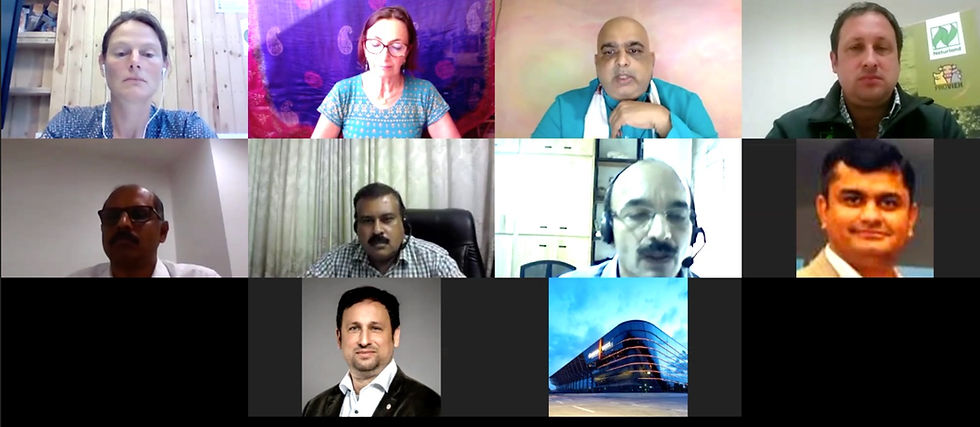Sustainability Reporting from an Exclusive Tool to a 'Must Have' for Market Visibility
- BiO ReporterIn

- Apr 13, 2021
- 3 min read
At the fifth edition of #OrganicWebinars series, our international experts introduced to their concepts of Sustainability Reporting. We welcomed the following experts: Volkert Engelman, CEO Eosta (Netherlands), Helmy Abouleish, CEO SEKEM (Egypt), Krishnendu Chatterjee, Sustainability Manager Ambootia and Tobias Bandel, Managing Director Soil & More Impact (Germany). They presented exciting insights to concepts like the "Sustainability Flower", ´True Cost Accounting´ and the ´Economy of Love´.

Recording of #organicwebinars, edition 5
Re-defining profit leads to a sustainable future
(min 6.30 29.00 on the video)
Corona is suffocating so many things but it also makes more than clear that we humans have taken away the planet´s ability to deal with the challenge of a pandemic, Volkert Engelsman starts his presentation. He was showing very impressive how scientist give their model how mankind is exploiting the resources of the Earth.

Chart by Nature&More (Eosta): We are living beyond our boundaries in many ways.
It is more than clear that we have to rethink our way of living and to re-define the definition of profit. Volkert said: profit it can only be if people and planet do not suffer from the profit of a few. That leads him to the statement - and this is already a fact in some nations economies (New Zealand, Bhutan) - that national wealth must include sustainable indicators. „There is even no way back“, he stated, as we are all in the same boat. „This new definition of profit will guide us into a sustainable future.“

Make sustainability visible for consumers
Eosta has created a Sustainability Flower years ago. All Eosta products carry a unique Nature & More Trace and Tell™ (QR) code that provides retailers and consumers with direct web access to the unique story of the producer as well as to the ecological and social impact of the production www.natureandmore.com. Sustainability goals are matched with UN´s Sustainable Development Goals (SDG).

Not enough: To visualize the importance of our natural resources soil, water, air on the PoS as well as the necessity of healthy food, Eosta has developed some very special campaigns.
Volkert emphasized: "Organic agriculture is the only way to keep our planet and ourselves healthy". The benefit for society is tremendous.

SEKEM´s concept: The Economy of Love
(min 29 - 39)
Helmy Abouleish told about the magical concept of SEKEM and the vision of his father Ibrahim Abouleish, ´The Economy of Love´ which is connected with the UN´s Sustainability Development Goals (SDG) and should carry not only the SEKEM community into a future where every human being can unfold his and her individual potential.

Ibrahim Abouleish, the founder of SEKEM, passed away in 2017.
The vision of SEKEM says that mankind is living in social peace reflecting human dignity and all economic activity is concluded in accordance with ecological and ethical principles.

Transparency throughout the whole value chain is one of the most important achievements SEKEM is working on. This goal leads beyond current certifications, should provide transparency along the whole value chain, prefers bio-dynamic methods and has a positive impact on the whole community.

Gathering of the SEKEM community
Krishnendu Chatterjee: Sustainability is our Responsibility
(min 39.40 - 51.30)
„We work for the future of next generations therefore sustainability is our responsibility“, said Krishnendu Chatterjee, who ist among others sustainability manager at the bio-dynamic Darjeeling Organic Tea Estate, Ambootia. The quite impressive work that includes 10,600 workers on 7.500 hectares of land in the Himalayas. He also emphasized the importance of good soil management: this has positive effects on all levels of nature (e.g.reduction of carbon) and society.

Ambootia has written a sustainability report and also works with True Cost Accounting in partnership with Soil& More. The traceability concept ´Leaf2Cup´ is basis of the quality assurance and works among others with geo-tagging and barcoding.
Soil & More Impact: Sustainability = ability to sustain
(min 51.30 - 1.06)
The last speaker of #organicwebinars this day was Tobias Bandel from Soil & More Impact. He reported that many recently published studies proving the importance of sustainability assessments and even urge that we have to change our way of producing food. Case studies show especially the necessity of soil improvement to maintain production costs as well as affordable food. „When you decrease the humus content production costs will go up“, he explains the result of a scientific study.

Soil & More Impact has developed a risk desk board where the status of soil, water and climate quality is measured. The data can help to create a strategy according to all risks and avoid high losses of production capacity.

Tobias said, that even big investors and the conventional food industry take these data into consideration in ratings because we are learning: „Natural capital is too important in our days to ignore it.“

From minute 1.06 onwards, questions, discussion, key take-aways.










Comments